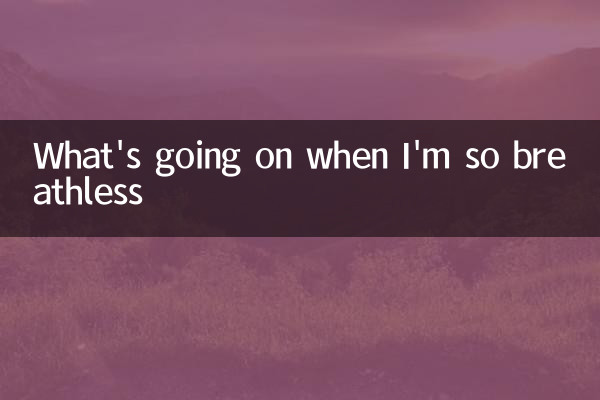What's going on when I'm so breathless
Recently, "I can't breathe" has become a hot topic of health that many netizens are concerned about. Both young people and middle-aged and elderly people may encounter problems with poor breathing. This article will combine the hot content of the entire network for the past 10 days to analyze the causes, related symptoms and response measures that may cause breathlessness, and help readers better understand this issue through structured data.
1. Analysis of common causes

According to recent search data and feedback from medical platforms, the main reasons for breathlessness include two major categories: physiological factors and pathological factors. The following are the high frequency reasons after sorting out:
| category | Specific reasons | Percentage (data in the past 10 days) |
|---|---|---|
| Physiological factors | Strong exercise, emotional tension, plateau reaction | 35% |
| Respiratory Diseases | Asthma, chronic obstructive pulmonary disease (COPD), pneumonia | 28% |
| Cardiovascular disease | Heart failure, arrhythmia, myocardial ischemia | 20% |
| Other factors | Anemia, anxiety, obesity | 17% |
2. Typical symptoms and related diseases
Difficulty in breathing caused by different causes may be accompanied by different symptoms. The following is the most discussed symptom combination among netizens recently:
| Main symptoms | Possible disease associated | Emergency |
|---|---|---|
| Can't breathe + chest pain | Angina pectoris, pulmonary embolism | Need to seek medical treatment immediately |
| Can't breathe + cough | Asthma, bronchitis | It is recommended to visit within 24 hours |
| Can't breathe + palpitations | Arrhythmia, anemia | Need to be checked as soon as possible |
| Suddenly wake up at night | Heart failure, sleep apnea | Need a specialist assessment |
3. Recent hot discussion cases
1.Long-term shortness of breath after "Yang Kang": Many netizens reported that they continued to feel exhausted after rehabilitation of the new crown. The doctor suggested that they can improve through lung function examinations and rehabilitation training.
2.Difficulty breathing in air-conditioned rooms in summer: Due to frequent use of air conditioners in high temperature weather, the air circulation is poor, and the number of cases of allergic asthma is increasing.
3.Adolescents are suddenly short of breath: During the physical examination of the middle school entrance examination, there were cases of severe dyspnea after exercise in many places. Experts reminded us to be vigilant about exercise asthma.
4. Countermeasures and suggestions
Based on the content published by the official account of Grade A hospital in the past 10 days, the following scientific suggestions are compiled:
| Scene | Emergency treatment | Long-term management |
|---|---|---|
| Sudden severe breathing difficulties | Call the emergency number immediately and stay half-sit | Improve cardiopulmonary function examination |
| Chronic recurring attacks | Use a doctor to prescribe first aid medication | Record the triggers and frequency of attacks |
| Environmental factors lead to | Leave the current environment and ventilate | Improve air quality in living/working environments |
5. Prevention tips
1. Adhere to abdominal breathing training. Practice for 10 minutes a day to enhance the strength of the respiratory muscles.
2. Clean the air conditioning filter regularly and use an air purifier to reduce the concentration of allergens in the room.
3. Avoid sudden and vigorous exercise and do a good job of warming up before exercise.
4. Control your weight. A BMI index exceeding 28 will significantly increase the risk of dyspnea.
5. It is recommended for people over 40 years old to undergo lung function screening once a year.
If the symptoms continue to relieve or worsen, be sure to go to the respiratory department or cardiovascular department in time. Recently, hospitals in many places have opened "Dyspnea specialty clinics" to provide more accurate diagnosis and treatment services.